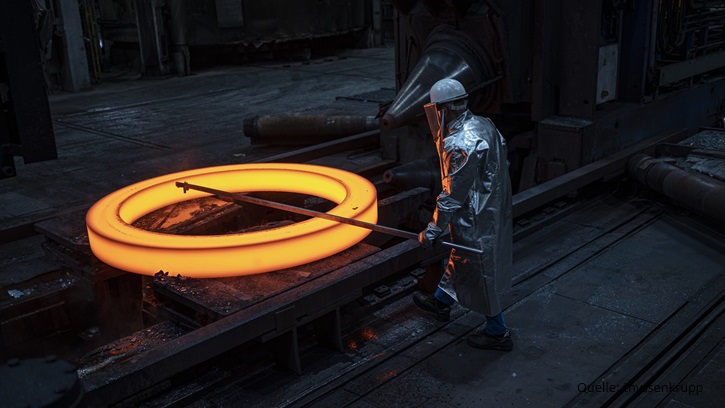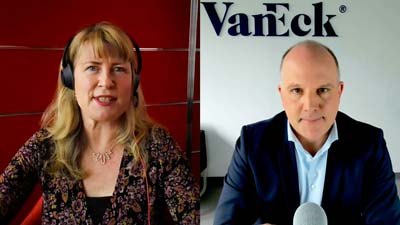Bereits seit acht Jahren verfolgen unsere Kollegen bei Morningstar in den USA die Aktivitäten ihrer favorisierten Aktienfondsmanager. Wir haben dieses Format auf Europa übertragen und die Käufe und Verkäufe prominenter Fondsmanager per Ende 2016 nachvollzogen (lesen Sie hier mehr). Doch wer sind die Manager hinter unserem neuen Format: "Die ultimativen Stock-Picker"? Sie finden nachfolgend die Kurzportraits der Fondsmanager sowie ein Steckbrief der von ihnen verwalteten Fonds in englischer Sprache. Der Name des Fonds ist mit einem Hyperlink versehen, der Sie zum ausführlichen Fondsportrait, inklusive Analyst-Report, auf unserer Homepage führt.
Nicolas Waleswski manages this fund opportunistically with no predetermined style bias. Generally, he is interested in businesses where all or certain assets are undervalued by the market, forgotten stocks, or companies with sources of profit growth that have not been fully accounted for. Whatever the investment thesis may be, he prefers businesses where he believes the management is credible and capable of delivering on the company's profitability potential. He tries to avoid market excesses and often takes contrarian stances in his investment choices. The portfolio structure depends largely on stock-picking. However, Walewski is conscious of the macroeconomic and market environment, which can help in controlling the portfolio's total risk.
The fund is managed since October 2009 by Thorsten Winkelmann in close collaboration with Matthias Born and the co-manager Robert Hofmann. The managers clearly pursue a long-term investment approach, resulting in a low portfolio turnover of 25-30% annually. The portfolio is the result of a pure stock picking process, searching for high quality and high structural growth companies, and typically consists of 50-70 stocks with a clear focus to the Large Cap Growth area of the Morningstar Style Box. In the portfolio construction, the managers do not look at any benchmark, so the sector and countries weights can differ from the category average and the benchmark.
BGF European Equity Income Fund
Alice Gaskell and Andreas Zoellinger make a strong combination. Gaskell’s experience at BlackRock dates back to 1994. Zoellinger joined the firm as an analyst in 2001 and has worked alongside Gaskell since 2005. The managers seek quality companies with sustainable and growing dividends. They look for undervalued companies featuring a high yield with a secure dividend and above-average dividend growth. However, the stocks must also meet the managers’ quality criteria, which is defined by strong corporate governance, a strong competitive position, and financial discipline as well as earnings stability.
Industry veteran Nigel Bolton took charge here in February 2008 and he was joined by comanager Amy Dey in March 2012. The managers have a flexible approach and will look for companies with attractive medium- to long-term earnings power as well as restructuring and turnaround situations. However, they also take into account the overall risks, which include the current prevailing macroeconomic and stock market environment.
BGF European Special Situations
Michael Constantis joined the firm in 2005 as an analyst and took over the fund in April 2007. Constantis’ penchant for growth stocks is borne out in the portfolio. He selects names predominantly from the bottom up for the relatively focused portfolio of 40-60 names. He looks for companies with earnings growth significantly above the market, above-average revenue growth, and valuations that suggest the market isn't properly valuing future growth.
Brian Hall took over this fund in Dec 2010. He applies a pragmatic value-oriented strategy, where he classifies value across three groups: stable value, cyclical value, and turnaround situations. Stable value companies are defined as those in defensive industries, with steady growth in cash and low volatility. Cyclical recovery stocks with expected mean reversion of profitability fall within cyclical value. The final group includes restructuring opportunities with either balance-sheet improvements or structural change.
The three managers are Arnaud Cosserat, Laurent Dobler, and Franz Weis, but management is highly collegial and each investment idea is discussed at length with all team members before being added to the portfolio. The investment process is clearly oriented to growth and quality companies.
The first step consists of identifying very solid companies with dominant market positions and high profitability regardless of the economic cycle. The companies selected are then subject to intensive fundamental research, including numerous visits to companies and meetings with their managers and their competitors. In the end, only 80 stocks make up the investment universe. They are then assessed under a rigorous valuation process based on discounted earnings and dividends.
Isaac Chebar has been the lead manager of this strategy since he joined DNCA in January 2007. Chebar seeks stocks deemed undervalued in the European equity universe and pays particular attention to valuation multiples such as price/earnings, price/book, or enterprise value/EBITDA. He distinguishes himself by considering these ratios in an historical context and comparing them to
their midcycle level. The investment horizon is fairly long, three years on average, which implies a low portfolio turnover of around 25% a year.
Victoire de Trogoff has gained 19 years of experience in the industry including eight as equity analyst. She joined Fidelity in Paris in 2002. She builds the portfolio around three distinct types of companies: structural growth at reasonable price, cyclical growth, and special situations. She evaluates any investment case by adopting a dynamic view of the business model, cash generation, and earnings growth. She seeks to identify entry points before the company enters a sturdy growth stage and when valuations are still reasonable in her view.
Fidelity European Dynamic Growth
Fabio Riccelli is a patient, bottomup stock-picker targeting companies capable of generating a 10%-15% total shareholder return for an extended period of time. Riccelli emphasises the growth duration of a company’s business, keeps a long-term perspective, and is willing to invest at relatively high valuation multiples. He generally focuses on firms that are less affected by external and macro factors, rely on internally generated cash flows to grow, boast high ROIC, and have sustainable competitive advantages.
Philippe Brugère-Trélat took over management of the fund in February 2005. He had already worked for Mutual Series from 1984 to 1994. Brugère-Trélat has many years of experience as an investor in European equities with the same value style that is the hallmark of Mutual Series.
Katrina Dudley, who joined the company in 2002, was promoted to comanager in 2007. The managers look for European large- and midcap stocks trading at steep discounts to their estimates of intrinsic value, putting a premium on free cash flow generation and corporate management that uses cash to benefit shareholders. They have a multiyear investment horizon, which has helped keep turnover well below peers.
Henderson Horizon Pan European Equity
Tim Stevenson has spent most of his 33-year investment career focused on European equities at Henderson, making him one of the most experienced investors in the sector. Managing this fund since its inception in 2001, he applies the same investment philosophy and approach that he has used since the early 1990s, focusing on investing in quality growth companies, in particular those whose earnings are not dependent on any phase within the economic cycle, over the long term.
Invesco European Growth Equity Fund
Clas Olsson, Jason Holzer, Borge Endresen, Matthew Dennis and Richard Nield are co-managers of this fund.As with many other Invesco strategies run by the same team, this fund's approach can be characterized as a cautious take on growth. In spite of its name, this portfolio typically lands in the large-blend area of the style box, and only intermittently in large-growth. The core of the process is a search for earnings growth, with the caveats that the earnings must be sustainable and not rely too much on leverage (debt). In addition, the price must be within an acceptable range. The catchphrase Invesco uses to describe this combination is EQV: earnings, quality, and valuation.
Alexander Darwall took over this fund in April 2007, but he joined Jupiter in 1995. Darwall's investment universe includes stocks in the FTSE World Europe Index, however, his search for growth-oriented companies typically leads him to mid-cap stocks within that universe. There is a strong focus in the manager's process on having an indepth understanding of how a company works and on maintaining regular contact directly with its management. The manager prefers firms with proven track records, clear business plans where management acts in the interest of shareholders, evidence of entrepreneurial endeavour, and above-average earnings growth prospects. He likes firms with differentiated products or services, a dominant market position, and superior pricing power.
Jupiter European Opportunities
Manager Cédric de Fonclare assumed responsibility for this fund in January 2003. He joined Jupiter in 1999 and has worked with the European team since 2000. He looks for companies with experienced and high-quality management, innovative products and services, and good organic growth. He looks to understand the growth dynamics of a business, the potential for change, and the extent of the mispricing in the share price that will create value for shareholders. Indeed, the manager demonstrates a pragmatic approach, and a small portion of the portfolio is invested in turnaround situations or stocks with short-term pricing anomalies.
Kempen (Lux) European High Dividend
The team, which consists of six experienced and knowledgeable managers, is led by Jorik van den Bos. It employs a traditional dividend strategy, which is applied with great discipline irrespective of market conditions. Portfolio candidates must offer a dividend yield of at least 2.5%, the valuation must include a safety margin, and companies must demonstrate significant capital discipline. Thorough bottom-up stock-picking results in a portfolio of approximately 50-75 equities.
The team, led by Metropole Gestion co-founder, Isabel Levy, who has nearly 30 years of experience and is supported by Ingrid Trawinski, first screens the investment universe on valuation criteria to detect stocks offering a discount of at least 20% compared with the estimated intrinsic value. The team prefers rather pragmatic valuation methods such as comparing financial ratios within the same sector or industry, the use of transaction multiples, or a sum-of-the-parts analysis. The next stage, which is more qualitative, consists of meeting the management of the companies to understand the business and the catalysts for revaluation, thus avoiding a major risk of the approach: buying value traps--that is, deep-value stocks that are likely to remain at depressed valuations.
MFS Meridian European Research
This fund is focused on bottom-up fundamental research, and MFS is known for the strength of its research culture. The European equity research team is led by Christopher Jennings and is supported by a team of 10 analysts. Named portfolio manager Gabrielle Gourgey provides oversight and cash flow facilitation rather than traditional stockpicking. The driving force behind portfolio construction is research undertaken by the analysts. Each of them can use his own models and research tools but the common thread is seeking companies with above-average sustainable growth, high-quality returns, and sound management.
Tom Stubbe Olsen has been managing the fund since its launch in November 1998. The investment approach differs from traditional value strategies, primarily in that emphasis is placed not only on valuation but also on the medium- to long-term earning power of the company. Investment ideas are generated at the initial stage by quantitative screenings, analyses by the in-house analyst team, or market monitoring. Companies are then subject to a qualitative examination using criteria such as corporate governance, financial and competitive strengths, or management quality. At the next stage, the fund manager and his team estimate the earnings power of each company over five years, from which the fair value of the stock is derived.
Oliver Kelton left Waverton Investment Management to join Odey Asset Management in March 2015, moving the Waverton European fund (now Odey European Focus) with him to the new firm. Kelton uses a pragmatic, stock-driven investment approach. Meeting companies is key to his process; he conducts over 400 company meetings in a given year. He looks for management teams whose interests are aligned with shareholders, and assesses their clarity of strategic vision and their historical competence. In a company, he seeks those with a predictable revenue stream and a strong franchise and assesses the competitive environment and any new product dynamics. Kelton is also mindful of companies’ working capital structures and financial leverage. He runs monthly screens on pan-European stocks with a market cap above $1 billion, focusing particularly on earnings changes, valuation anomalies, and director dealings, among other metrics.
Schroder European Special Situations
The fund has been managed from launch in March 2006 by Leon Howard-Spink. He is supported by comanager Paul Griffin, who has worked alongside him since July 2007. Howard-Spink and Griffin are drawn to solid franchises, good culture, and focused management. They like companies with dominant positions in niche markets as well as market leaders and oligopolies, companies with proven and expanding business models with low capital-intensity and with the ability to benefit from cost-cutting and pricing power. To find these, the managers evaluate the business model, growth drivers, quality of management, and valuations. They also pay close attention to financial factors such as the sustainability of the cash flow stream and the sustainability of returns.
Schroder European Opportunities
Steve Cordell has run this fund since its launch in 2003. His investment style is pragmatic. He selects stocks after thorough fundamental analysis, but the portfolio is then constructed in conjunction with his team's macro views. First, to reduce the universe to a manageable size, the team members use a quantitative screen with value and momentum factors; the screen also accounts for analyst revisions and leverage. The resulting list of stocks is then analyzed in more depth to form a fair value estimate. They consider fundamental factors such as cash flow return on investment and the company's position given its industry's growth and profitability, as well as business cycle factors such as GDP growth and inflation.
Dean Tenerelli pursues companies with high-quality fundamentals, including superior profitability across the market cycle, a durable and superior cash flow profile, and quality balance sheets. He favors firms with traits that are conducive to sustainable growth, such as those that are in industries with high barriers to entry. He also prefers company management that is investor-oriented, has a clear strategy, and deploys capital well. He looks at both absolute and relative valuations--and pays ample attention to zero growth cash flow valuation and intrinsic worth--and owns both value and growth stocks. Tenerelli adopts an all-cap approach, so the fund's average market cap is usually well below that of its average peer and the MSCI Europe Index.
Die in diesem Artikel enthaltenen Informationen dienen ausschließlich zu Bildungs- und Informationszwecken. Sie sind weder als Aufforderung noch als Anreiz zum Kauf oder Verkauf eines Wertpapiers oder Finanzinstruments zu verstehen. Die in diesem Artikel enthaltenen Informationen sollten nicht als alleinige Quelle für Anlageentscheidungen verwendet werden.

















